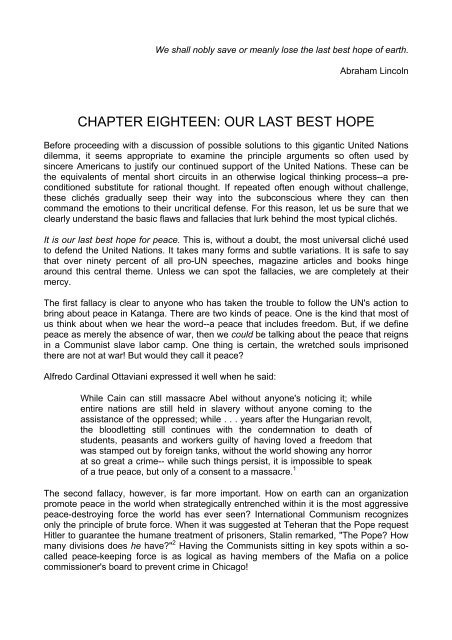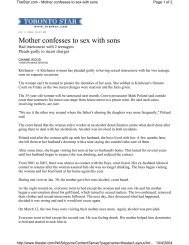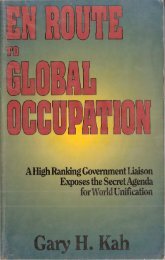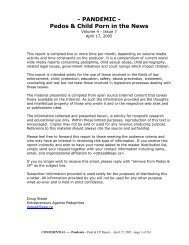G. Edward Griffin - The Fearful Master - PDF Archive
G. Edward Griffin - The Fearful Master - PDF Archive
G. Edward Griffin - The Fearful Master - PDF Archive
Create successful ePaper yourself
Turn your PDF publications into a flip-book with our unique Google optimized e-Paper software.
We shall nobly save or meanly lose the last best hope of earth.<br />
Abraham Lincoln<br />
CHAPTER EIGHTEEN: OUR LAST BEST HOPE<br />
Before proceeding with a discussion of possible solutions to this gigantic United Nations<br />
dilemma, it seems appropriate to examine the principle arguments so often used by<br />
sincere Americans to justify our continued support of the United Nations. <strong>The</strong>se can be<br />
the equivalents of mental short circuits in an otherwise logical thinking process--a preconditioned<br />
substitute for rational thought. If repeated often enough without challenge,<br />
these clichés gradually seep their way into the subconscious where they can then<br />
command the emotions to their uncritical defense. For this reason, let us be sure that we<br />
clearly understand the basic flaws and fallacies that lurk behind the most typical clichés.<br />
It is our last best hope for peace. This is, without a doubt, the most universal cliché used<br />
to defend the United Nations. It takes many forms and subtle variations. It is safe to say<br />
that over ninety percent of all pro-UN speeches, magazine articles and books hinge<br />
around this central theme. Unless we can spot the fallacies, we are completely at their<br />
mercy.<br />
<strong>The</strong> first fallacy is clear to anyone who has taken the trouble to follow the UN's action to<br />
bring about peace in Katanga. <strong>The</strong>re are two kinds of peace. One is the kind that most of<br />
us think about when we hear the word--a peace that includes freedom. But, if we define<br />
peace as merely the absence of war, then we could be talking about the peace that reigns<br />
in a Communist slave labor camp. One thing is certain, the wretched souls imprisoned<br />
there are not at war! But would they call it peace?<br />
Alfredo Cardinal Ottaviani expressed it well when he said:<br />
While Cain can still massacre Abel without anyone's noticing it; while<br />
entire nations are still held in slavery without anyone coming to the<br />
assistance of the oppressed; while . . . years after the Hungarian revolt,<br />
the bloodletting still continues with the condemnation to death of<br />
students, peasants and workers guilty of having loved a freedom that<br />
was stamped out by foreign tanks, without the world showing any horror<br />
at so great a crime-- while such things persist, it is impossible to speak<br />
of a true peace, but only of a consent to a massacre. 1<br />
<strong>The</strong> second fallacy, however, is far more important. How on earth can an organization<br />
promote peace in the world when strategically entrenched within it is the most aggressive<br />
peace-destroying force the world has ever seen? International Communism recognizes<br />
only the principle of brute force. When it was suggested at Teheran that the Pope request<br />
Hitler to guarantee the humane treatment of prisoners, Stalin remarked, "<strong>The</strong> Pope? How<br />
many divisions does he have?" 2 Having the Communists sitting in key spots within a socalled<br />
peace-keeping force is as logical as having members of the Mafia on a police<br />
commissioner's board to prevent crime in Chicago!



![Robert T McQuaid [rtmq@stn.net] Sent: Friday, October 29, 2004 12 ...](https://img.yumpu.com/51070071/1/190x245/robert-t-mcquaid-rtmqstnnet-sent-friday-october-29-2004-12-.jpg?quality=85)







